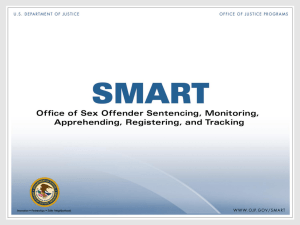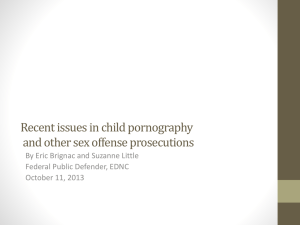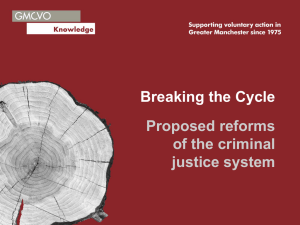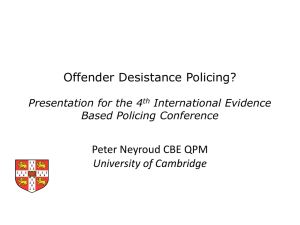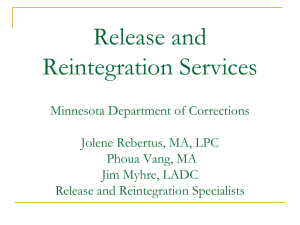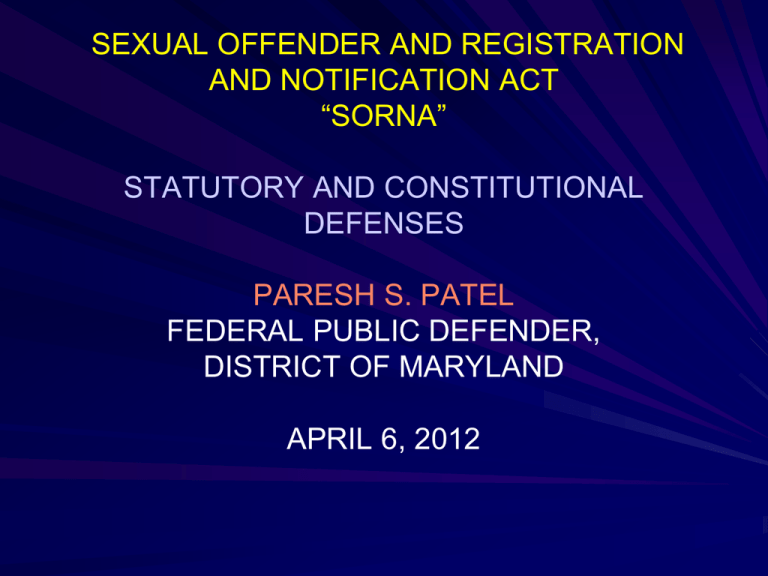
SEXUAL OFFENDER AND REGISTRATION
AND NOTIFICATION ACT
“SORNA”
STATUTORY AND CONSTITUTIONAL
DEFENSES
PARESH S. PATEL
FEDERAL PUBLIC DEFENDER,
DISTRICT OF MARYLAND
APRIL 6, 2012
Relevant Authority and Dates
■ SORNA Registration Provisions (42 U.S.C. § 16901-962)
Signed into law on July 27, 2006
■ Criminal Failure to Register Provision (18 U.S.C. § 2250)
Signed into law on July 27, 2006
■ SMART Guidelines:
Final Guidelines (73 Fed. Reg. 38030) Issued July 2, 2008 (Effective August 1, 2008 after notice and comm.)
Suppl. Guidelines (76 Fed. Reg. 1630)Issued Jan. 11, 2011
■ 28 C.F.R. § 72.3 (Attorney General Reg. Making SORNA retroactive to preenactment and pre-implementation offenders)
Interim Reg: Feb. 28, 2007; Final Reg: Jan. 28, 2011
SORNA Registration
Provisions
(42 U.S.C. § 16901-962)
SORNA REGISTRATION REQUIREMENTS
■
SORNA Replaces Wetterling Act
(42 U.S.C. § 14071-73)
■
SORNA much more onerous:
- includes tribes and territories
- expands definition of sex offenses
- requires automatic registration w/o hearing on risk
or classification as sex offender
- requires internet posting for most offenders
- increases duration of registration for some
offenders
- increases criminal penalties for failure to register
SORNA Registration: Dual Obligations
■
Local Jurisdictions’ (States, Terr.,
Indian Tribes) Obligation: Must
implement SORNA or lose money
■
Sex Offenders’ Obligation:
Individual duty to register within
local jurisdictions, regardless of state’s
choice to implement SORNA.
Pre-Implementation Challenge Rejected
United States v. Gould, 568 F.3d 459 (4th Cir. 2009)
■
Defendant argued that SORNA does not apply in
states which have not yet implemented SORNA:
based on 42 U.S.C. § 16913(d) and SMART Guidelines
(73 Fed. Reg. 38064)
■
Fourth Circuit as well as every other Circuit to have decided
issue has rejected argument: holding that SORNA imposes
individual duty to register separate and apart from state’s
obligations.
SORNA REGISTRATION REQUIREMENT
BASICS
■
Initial Registration:
Each jurisdiction where sex offender
resides, works, goes to school, & was
convicted (if different from where resides)
Before completing term of imprisonment
OR within 3 days of receiving non-prison
sentence.
42 U.S.C. § 16913(a)
SORNA REGISTRATION REQUIREMENT
BASICS
■
Update Registration:
Within 3 days of any change to name,
residence, employment or student status
Only need to update in one of the required
jurisdictions, but must be in person
42 U.S.C. § 1963(b)
SORNA REGISTRATION REQUIREMENT;
BASICS
■
Verify Registration:
– In-person at each jurisdiction where required
to register
– every year (Tier I)
– every 6 months (Tier II)
– every 3 months (Tier III)
42 U.S.C. § 16916
FAILURE TO REGISTER
18 U.S.C. § 2250(a)(2)(B)
(State Sex Offenses)
Elements:
1) Required to register under SORNA;
2) Travels in interstate commerce, and
3) Thereafter, knowingly fails to register or
update as required by SORNA
10 year maximum penalty
FAILURE TO REGISTER
18 U.S.C. § 2250(a)(2)(A)
(Federal, Territorial, and Tribal Sex Offenses)
Elements:
1) Required to register under SORNA;
and
2) Thereafter knowingly fails to register or
update as required by SORNA
10 year maximum penalty
SORNA AND FAILURE TO
REGISTER:
POSSIBLE STATUTORY
AND CONSTITUTIONAL
DEFENSES
DEFENSE 1:
No “sex offense”
WHAT CONSTITUTES A “SEX OFFENSE” ?
■
criminal offense that “has an element involving a sexual
act or sexual contact with another”
■
specified offense against a minor
■
certain listed federal, military, and foreign offenses
■
attempts or conspiracies
■
juvenile adj. for juveniles age 14 or older who
commit offense comparable to or > severe than
aggrav. sexual abuse under 18 U.S.C. 2241 or
attempt or conspiracy to commit such crime.
■
certain consensual sexual acts
42 U.S.C. § 16911
CATEGORICAL APPROACH AND “SEX OFFENSE”
■
Only elements - not underlying conduct - can qualify
prior crime as “sex offense” under SORNA.
See Shepard v. United States, 544 U.S. 13 (2005);
Taylor v. United States, 495 U.S. 575 (1990)
■
Attorney General has suggested categorical
approach should apply with everything except for
age of victim - SMART Guidelines: 73 Fed. Reg.
38031.
CATEGORICAL APPROACH
“SEXUAL ACT OR SEXUAL CONTACT WITH ANOTHER”
■
Requires “element involving a sexual act or sexual
contact with another.” 42 U.S.C. § 16911
■
Clause covers “all sexual offenses whose elements
involve any type or degree of genital, oral, or anal
penetration, or any sexual touching of or contact
with a person’s body, either directly or through the
clothing.” 73 Fed. Reg. 39051.
CATEGORICAL APPROACH:
“SPECIFIED OFFENSES AGAINST A MINOR”
42 U.S.C. § 16911
- Non-parental kidnapping or false imprisonment of a minor
-
Solicitation of a minor to engage in sexual conduct
Use of a minor in a sexual performance
Solicitation of a minor to practice prostitution
Video voyeurism involving a minor
Possession, production, or distribution of child pornography
Criminal sexual conduct involving a minor and related internet
activities
- Any conduct that, by its nature, is a sex offense against a minor,
including convictions for child molestation, sexual activity w/
underage persons and child prostitution.
Categorical Approach: “Specified offenses against a minor”
■
“criminal sexual conduct involving a minor” =
“sexual offenses whose elements involve physical
contact with the victim” or “offenses whose elements
involve using others persons in prostitution”
72 Fed. Reg. 38052
■
“conduct, that, by its nature, is a sex offense against a minor” =
-
“status of the victim as a minor” must be element of prior offense. 73 Fed. Reg. 38052
-
“by its nature” language calls for categorical approach –
See Cain v. State, 872 A.2d 682 (Md. 2005);
State v. Chun, 76 P.3d 935 (Haw. 2003)
Beware of United States v. Dodge, 597 F.3d 1347
(11th Cir. 2010)
■
analogize to categorical approach used in ACCA/career offender “otherwise” clause which
includes “involving conduct” language.
■
SORNA only applies to those convicted of a sex offense – not merely those who committed sex
offense. 42 U.S.C. §16911 (1)
Enumerated “sex offenses”
■ Use Model Penal Code to determine generic definition of
offense.
See United States v. Peterson, 629 F.3d 432 (4th Cir.
2011).
SMART GUIDELINES:
RE-DEFINING OF “SEX OFFENSES”
Beware of Attorney General’s expansion and addition of sex offenses beyond that
specified by Congress in SORNA.
-
Plain language of SORNA does not allow Attorney General to add new
offenses and broaden SORNA’s def. of “sex offenses.”
-
Attorney General not authorized to add new offenses; to read SORNA
otherwise violates non-delegation doctrine.
See Panama Refining Co. v. Ryan, 293 U.S. 388 (1935).
-
Constitutional Avoidance. See Clark v. Martinez, 543 U.S. 371 (2005).
Examples:
■
“Attempt” and “Conspiracy” – broadened by SMART Guidelines to include
“assault with intent to rape” 73 Fed. Reg. 38051.
■
“Solicitation to engage in sexual conduct” redefined by SMART
Guidelines to include “any direction, request, enticement, persuasion, or
encouragement of a minor to engage in sexual conduct.” 73 Fed. Reg. 38051
DEFENSE 2:
Is Prior Offense a Valid
Conviction?
Valid Conviction
1)
Must be conviction (42 U.S.C. § 16911)
2)
Convictions that are set aside, expunged, or vacated do not count
(SMART Guidelines: 73 Fed. Reg. 38050)
3)
Foreign conviction obtained without sufficient safeguards for due
process is invalid – 42 U.S.C. § 16911 and 73 Fed. Reg. 38050 –
See U.S. State Dept. Country Reports on Human Rights Practices
4)
Argue that any conviction is invalid if obtained without proper
waiver of counsel – U.S. v. Custis, 511 U.S. 485 (1994)
5)
Argue tribal convictions invalid if no right to counsel. – Sentencing
Commission does not count them, U.S.S.G. § 4A1.2
DEFENSE 3:
Duration of reg. term expired?
DURATION OF REGISTRATION:
■
Depends on Tier Level Determined by Type
of Sex Offense and Prior Criminal History
under 42 U.S.C. § 16911.
42 U.S.C. § 16915.
DURATION OF REGISTRATION
■
Tier I: 15 years (or 10 years if “clean
record”)
Clean record:
-
No convictions for offenses punishable by
more than one year; and
-
No sex offense convictions; and
-
No revocation of supervised release,
parole, or probation; and
-
successful completion of cert. sex offender
treatment program
DURATION OF REGISTRATION
■
Tier II: 25 years – No clean record break
■
Tier III: Life (or 25 years with clean record)
16 U.S.C. § 16915
DURATION OF REGISTRATION
■ Registration period begins to run
1) upon release from custody of an offender who has
been incarcerated;
2) at time of sentencing, for an offender who receives
non-prison sentence.
■ Permit, but do not require jurisdictions to toll registration
while offender is incarcerated. SMART Guidelines:
73 Fed. Reg. 38068.
DURATION OF REGISTRATON
CLASSES OF SEX OFFENDERS ( Tier I, II, and III)
Use categorical approach in determining tier except with
respect to age of victim.
SMART Guidelines: 73 Fed. Reg. 38053.
DEFENSE 4:
Has the offender established
a “RESIDENCE”?
Residence
- Must register or update registration within 3 business days after sex
offender establishes new “residence.” 42 U.S.C. § 16913
-
Resides: “location of the individual’s home or other place where the
individual habitually lives.” 42 U.S.C. § 16911.
One “habitually lives” in a place if he stays there for 30 days.
SMART Guidelines: 73 Fed. Reg. 38062.
-
Thus, if sex offender intends to live in place for 30 days, it is a
residence, and he must register within three days of moving there.
73 Fed. Reg. 38062.
Residence: Transients
-
Beware of United States v. Bruffy, 2012 WL 503808 (4th Cir. 2012)
4th Cir. found that defendant who moved from Florida
established residence at a specific location in Va., even though
he lived in his car most of the 23-day period in question and
intended to get an apartment in Maryland after he found a job
there.
Because he failed to report this change of so called
residence, he was convicted of failure to update registration in
Florida and failing to register in Virginia.
See dissent – J. Gregory believes that defendant’s living
situation was too transient and unstable that it was not
“habitual” and therefore not “residence”
Residence: Transients
Even if offender does not have fixed abodes, must
register with detailed information as possible of
where one habitually lives (residence):
i.e., part of city that is habitual locale –
park or spot on street (or number of
such places) where the sex offender
stations himself during day or sleeps at
night, shelters, and buildings
frequented)
SMART Guidelines: 73 Fed. Reg. 38055
Residence: Transients
1)
Sex offender must update registration when he terminates
residence (leaves with no intention to return), even if he has no
fixed future place of residence . SMART Guidelines: 73 Fed.
Reg. 38066; See also United States v. Van Buren, 599 F.3d
170 (2d Cir. 2010); United States v. Voice, 622 F.3d 870 (8th
Cir. 2010); United States v. Murphy, 664 F.3d 798 (10th Cir.
2011); United States v. Bruffy, 2012 WL 503808 (4th Cir.
2012).
But see dissent in Murphy, 664 F.3d 798 (No duty to update in
former jurisdiction of residence because lang. in SORNA
statute only requires reg. in jurisdiction in which one resides –
not where he formerly resided)
Residence: Transients
Void for Vagueness
United States v. Bruffy, 2012 WL 503808 (4th Cir. 2012):
Rejected defense’s argument that the term “reside”
in SORNA is unconstitutionally vague as applied to
transient offenders who have vacated one
residence, but have not yet established a fixed place
to live in another state.
Defense argued that SORNA fails to provide fair
notice of the point in time when presence in a new
jurisdiction triggers the registration requirement.
DEFENSE 5:
Pre-Implementation and PreEnactment Offenders
Pre-Implementation and Pre-Enactment
Offenders
AG has the “authority” to decide if SORNA
retroactive to pre-implementation and preenactment offenders and prescribe rules for their
registration.
42 USC 16913(d)
INTERIM REG. OF ATTORNEY GENERAL,
28 C.F.R. § 72.3
■ Effective Feb. 28, 2007
■ Makes SORNA applicable to pre-enactment and pre-imp. sex off.
■ Enacted pursuant to Congress’ directive –
42 U.S.C. § 16913(d)
■ No pre-enactment offender can be prosecuted under Failure to
Register statute unless he traveled in interstate commerce and
failed to register after Feb. 28, 2007.
United States v. Hatcher, 560 F.3d 222 (4th Cir. 2009)
■ Argue no pre-implementation offender can be prosecuted under
Failure to Register statute unless he traveled in interstate commerce
and failed to register after Feb. 28, 2007.
United States v. Trent, 654 F.3d 574 (6th Cir. 2011)
Interim Regulation: APA Challenge
■
No notice and comment under Administrative Procedure Act before interim
regulation, 28 C.F.R. § 72.3
■
United States v. Gould, 568 F.3d 459 (4th Cir. 2009)
No APA violation because good cause to excuse notice and comment
■
See J. Michael dissent in Gould
■
Split in the Circuits – Preserve for S.C. review
Finding APA violation:
United States v. Cain, 583 F.3d 408 (6th Cir. 2009); United States v. Utesch,
596 F.3d 302 (6th Cir. 2010); United States v. Valverde, 628 F.3d 1159
(9th Cir. 2010)
No APA violation:
United States v. Dean, 604 F.3d 1275 (11th Cir. 2010); United States v.
Johnson, 632 F.3d 912 (5th Cir. 2011) (found APA violation harmless); United
States v. Dixon, 551 F.3d 578 (7th Cir. 2008) (assumed w/o deciding that reg.
was valid).
Interim Regulation:
Standing of pre-enactment and pre-implementation
offenders to make
APA challenge to interim regulation
■ Reynolds v. United States, 132 S. Ct. 975 (2012): Confirmed that
pre-enactment offenders having standing to make APA challenge to
interim regulation because the interim regulation – not Congress -made SORNA applicable to pre-enactment offenders.
■ Under rationale of Reynolds, pre-implementation offenders also
have standing to make APA challenge to interim regulation.
Interim Regulation, 28 C.F.R. § 72.3: Finalized
■ Effective January 28, 2011; 75 Fed. Reg. 81849
■ Issued after notice and comment
■ No viable APA challenge for failure to register and
interstate travel after January 28, 2011
Beware of cases holding that any APA violation was cured by August
1,2008, eff. date of Final SMART Guidelines: United States v.
Stevenson, __ F.3d __, 2012 WL 573326 (6th Cir. 2012);
United States v. Utesch, 596 F.3d 302 (6th Cir. 2010);
United States v. Valverde, 628 F.3d 1159 (9th Cir. 2010).
DEFENSE 6:
Non-Delegation Doctrine
Non-Delegation Doctrine
United States v. Burns, 2011 WL 970644 (4th Cir. 2011)
■
Def. argued Congress unlawfully delegated legislative authority
to Attorney General to determine retroactivity of SORNA to preenactment offenders.
■
4th Circuit rejects argument: holds that Attorney’s authority
bounded by policies and requirements set forth in SORNA.
■
But unpublished decision; preserve for S.C. review even
though no split in the Circuits. S.C. might take up issue along
with APA challenge to interim regulation.
See dissent in Reynolds
DEFENSE 7:
Date of Travel after
United States v. Carr
Interstate Travel must occur after passage of
SORNA
■
United States v. Carr, 130 S. Ct. 2229 (2010)
Under statutory terms of the Failure to Register statute, a sex
offender can only be prosecuted if he traveled in interstate
commerce after the enactment of SORNA on July 27, 2006.
■
But in Fourth Circuit under Hatcher, 560 F.2d 222, travel for
pre-enactment and pre-imp. offenders must be not only after
July 27, 2006, but also after February 28, 2007– date of interim
regulation applying SORNA to pre-enactment and pre-imp.
offenders.
■
But remember to preserve argument that travel for preenactment and pre-imp offenders must be after
Jan. 28, 2011 – only then did AG issue valid reg. after n and c.
DEFENSE 8:
Group of Offenders Unable to
Comply with SORNA
SORNA REGISTRATION REQUIREMENT:
Unable to Comply with SORNA
AG must prescribe rules for registration of people
unable to comply with SORNA’s initial registration
requirements.
42 USC §16913(d); 42 USC §16913(b)
Group of Offenders Unable to Comply with SORNA
■ Gould, 568 F.3d 459
Def. argued that he was unable to initially register under 42
U.S.C. § 16913(b) because he was released from prison on
underlying sex offense before SORNA was enacted.
-
Fourth Circuit rejected argument: held sex offender is able to
comply with SORNA if required to register under state law.
■ Kennedy v. Allera, 612 F.3d 261 (2010) (Gets even worse)
-
Def. argued that he was unable to initially register because he
was not required to register under state law.
-
In conflict with Gould, Court held that a sex offender is able to
comply with SORNA as long as a state sex offender registry
exists – even if he is not required to register under state law.
Group of Offenders Unable to Comply
with SORNA
■ See SMART Guidelines Examples:
38 Fed. Reg. 38063
Make plain that sex offenders are unable to
comply with SORNA if not required to register
under state law.
■ Make constitutional avoidance argument: if not
required to register, will get no notice required
under due process.
DEFENSE 9:
No Notice of Duty to Register
Duty to Notify and Ensure Registration,
42 USC 16917(a)
An appropriate official shall, shortly before release of the
sex offender from custody, or, if the sex offender is not in
custody, immediately after the sentencing of the sex
offender, for the offense giving rise to the duty to
register-(1) inform the sex offender of the duties of a sex offender
under this title and explain those duties;
(2) require the sex offender to read and sign a form
stating that the duty to register has been explained and
that the sex offender understands the registration
requirement; and
(3) ensure that the sex offender is registered.
Notice – Statutory Requirement
Gould, 568 F.3d 459
■
Statutory argument:
Def. argued that he could not be punished for “knowingly” failing to
register because SORNA has affirmative notice provision under
42 U.S.C. § 16917.
Fourth Circuit rejected: held that Failure to Register general intent
crime; knowledge of facts constituting crime required- not knowledge
of law itself.
However, in Reynolds oral argument, the Solicitor General said the
following:
SORNA “require[s] that any failure to register, in order to be subject to
prevailing sanctions, that it be a knowing failure to register. In other
words, that the offender know he has a registration requirement and
know that he is complying with that requirement.”
See also dissent in United States v. Vasquez, 611 F.3d 325 (7th Cir. 2010)
Notice – Constitutional Due Process
Gould, 568 F.3d 459
■
Constitutional Due Process:
Def. argued that passive activity of failing to register cannot be
punished without notice under
Lambert v. California, 355U.S.255 (1957).
Fourth Circuit rejected: held that as long as one has notice of
duty to register under state law, no additional notice of
SORNA required; he knows he is engaging is some
wrongdoing. Other Circuits have held the same.
■
If defendant did not have notice of duty to register under
state law or SORNA, then you have good due process
argument.
DEFENSE 10:
Commerce Clause
Commerce Clause
Gould, 568 F.3d 459,
Defendant argued:
■
SORNA reg. provision (42 U.S.C. 16913) violates Commerce Clause because
- No Interstate Commerce Element;
- No Substantial Effect on Interstate Commerce –
No Economic Activity
■
Failure to Register Statute (18 USC 2250(a)(2)(B)) violates Commerce Clause
- No Nexus Required Between Interstate Travel and Failure to Register
- No Substantial Effect on Commerce – No Economic Activity
Fourth Circuit rejected both arguments:
-
Substantial effect on commerce because SORNA is part of larger
comprehensive interstate national problem; SORNA enacted to preclude
avoidance of registration thru flight across state lines:
-
No nexus required between travel and harm regulated.
But See great dissent: United States v. Vasquez, 611 F.3d 325 (7th Cir. 2010)
Commerce Clause
Failure to Register Statute (18 USC 2250(a)(2)(A)) – For federal
offenses:
No travel requirement, yet courts thus far have upheld under
Necessary and Proper Clause either:
1) because it is necessary and proper to carry out Congress’
supervisory power over federal offenders,
or
2) because it is necessary and proper to effectuate Congress’
Commerce Clause power.
United States v. George, 625 F.3d 1124 (9th Cir. 2010) (pending en
banc); United States v. Kebodeaux, 647 F.3d 137 (5th Cir. 2011);
United States v. Carel, __F.3d__, 2011 WL 6880674 (10th Cir.
2011); United States v. Yelloweagle, 643 F.3d 1275 (10th Cir. 2011)
DEFENSE 11:
Tenth Amendment
Tenth Amendment: Commandeering
Kennedy v. Allera, 612 F.3d 261
■
Defendant argued that by requiring him to register in
a state in which he was not required to do so under
state law, feds were forcing state to comply with
federal law – SORNA.
■
Fourth Circuit rejected argument: feds did not put
demand on state to register defendant; state’s
choice to reject defendant’s registration
DEFENSE 12:
Ex Post Facto
Ex Post Facto (Generally)
United States v. Burns, 2011 WL 970644 (4th Cir. 2011)
■
Def. argued that requiring pre-enactment sex
offenders to register results in ex post facto
punishment; SORNA is punitive
■
Fourth Circuit did not decide issue. Continue to
preserve although no love from other Circuits.
Ex Post Facto - Juveniles
United States v. Juvenile Male, 590 F.3d 924
(9th Cir. 2010)
■
Retroactive application of SORNA to a juvenile adjudicated
delinquent prior to SORNA – ex post facto violation.
Disclosure of juvenile info (historically shielded from
public) is punitive – severely damaging to economic, social,
psychological, and physical well being of juveniles.
Beware: Supreme Court dismissed case for mootness because sex
offender registration condition ended with def.’s 21st bday,
131 S. Ct. 2860 (2011) - Still use rationale.
See also United States v. W.B.H., 664 F.3d 848
(11th Cir. 2011) (No ex post facto viol. for Youthful
Offender Act conviction).
DEFENSE 13:
Venue
Venue
■ United States v. Burns, 2011 WL 970644,
-
Def. argued that because client failed to register in Ca.,
Va. was improper venue for Failure to Register prosecution.
-
Fourth Circuit rejected arg. because travel started in Va. –
travel part of offense conduct.
■ United States v. Pietrantonio, __ F.3d __, 2011 WL 869477
(8th Cir. 2011)
-
Improper venue if neither travel or failure to register connected
to federal district of prosecution.
DEFENSE 14:
Dupliticious Indictment
Duplicitous Indictment
United States v. Pietrantonio,
637 F.3d 865 (8th Cir. 2011)
-
Two separate and distinct failure to register
allegations cannot be charged in one count
of an indictment.
DEFENSE 15:
Affirmative Defense
Affirmative Defense:
18 U.S.C. § 2250
- Uncontrollable Circumstances prevented
defendant from complying with SORNA;
- He did not contribute to the creation of
such circumstances in reckless disregard
of requirement to comply; and
- Complied as soon as circumstances
ceased to exist.
DEFENSE 16:
Supervised Release
Conditions
Supervised Release Conditions
Under 18 U.S.C. § 3583(d), conditions
1)
must be reasonably related to goals of sentencing;
2)
must involve no greater dep. of liberty than
necessary to deter criminal conduct,
protect the public, and provide for def.’s educ.,
vocational, medical, and corr. needs;
3)
must be individualized
Supervised Release Conditions
Conditions continued
4)
must not delegate unbridled discretion to the
probation officer; and
5)
must not impinge on First Amendment rights.
Supervised Release Conditions
- Conditions invalidated by courts:
- Movement restrictions – no coming within 500 feet of
schools, yards, parks, arcades, etc. United States v.
Smith, 655 F.3d 839 (8th Cir. 2011)
- Possessing pornography in any form – United States v.
Curry, 627 F.3d 312 (8th Cir. 2010)
- Possessing any material, legal or illegal, that contains
nudity or that depicts or alludes to sexual activity United States v. Simons, 614 F.3d 475 (8th Cir. 2010)
Supervised Release Conditions
- Polygraph testing ok if incriminating statements
not compelled in violation of Fifth Amendment.
See United States v. Talada, 2010 WL 2182204
(4th Cir. 2010)
RESOURCES
www.fd.org
Paresh_patel@fd.org
Christine_lee@fd.org
Candace_Cain@fd.org
(brief bank on SORNA issues)
GOOD SUMMARY:
SMART GUIDELINES
Summary of Final National Guidelines for Sex
Offender Registration and Notification For
Implementation of SORNA,
National Conference of State Legislatures, Jan.
2009.
Supplemental SORNA Guidelines,
National Conference of State Legislatures, May
2010.
http://www.ncsl.org

